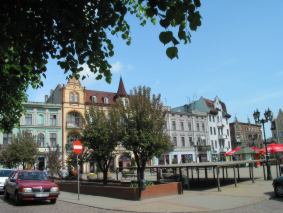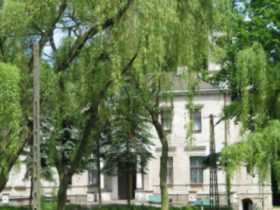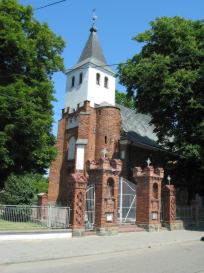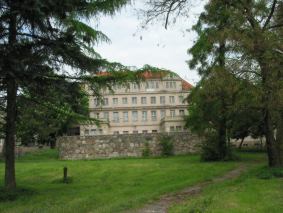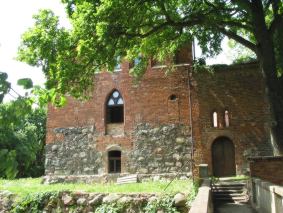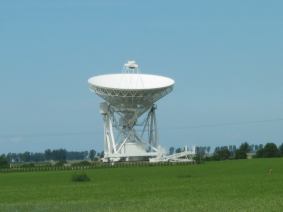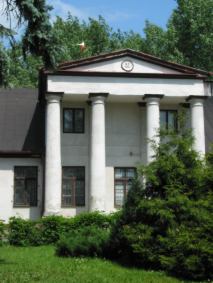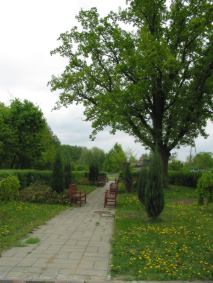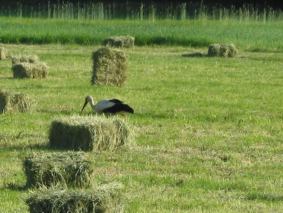THE TOWN OF CHEŁMŻA
The only town of the Toruñ District, Chełmża, is situated about 20 kilometers north of Toruñ, near national road No.1 which connects the coast with the southern border of the country. This ancient town has just celebrated the 750th anniversary of its receipt of civic rights. It draws many tourists who come to admire its impressive gothic cathedral - one of the biggest in northern Poland, many old churches, and a gothic gate. All these monuments remind us of the centuries when Chełmża was a residence of the Bishop of the Chełmińska Land and played an important religious and political role.
Presently, the town remains a regional center – providing surrounding villages with many urban facilities, such as government offices, various institutions, banks, post offices, health care centers, a hospital, police and fire brigade units. These are complimented by a good school network including high schools, libraries, cultural associations, and numerous sport clubs.
The city’s major employer is the sugar industry represented by the Sugar Factory Co. (presently Nord Zucker), formerly one of the largest plants of its kind in Europe. There are many other industrial branches ranging from construction, furniture production and plastic industry to food processing. Also, the service and trade sectors are well developed. There are still many investment opportunities and the city’s government creates favorable conditions for those willing to set up businesses and create new employment.
One of Chełmża’s greatest assets is Chełmżyńskie lake – the biggest in the whole District. There is a good tourist base – but still ample opportunity for new investments. There are several marinas, a public beach, equipment hires, camping sites and a catering industry network. Tourists are attracted by good sailing, surfing, and swimming conditions.
Friendly inhabitants, pretty architecture and water sports draw many visitors every year.
THE COMMUNE OF CHEŁMŻA
The biggest economic asset of the commune of Chełmża is its agriculture. There are many individual farmers and agricultural producers, but also a fair number of collectives. By themselves or within associations, local farmers provide excellent quality products including cereals, fruits, vegetables and livestock. Because the Chełmża sugar plant is located nearby, sugar beets constitute an important crop.
The local economy is supported by a number of various enterprises ranging from a major road construction company, "Bielczyny", through agribusiness to furniture production, construction companies, trade, craftsmen and many, many others.
The commune is a regional leader in making use of EU funds. Much of the area’s well-developed infrastructure was supported with money from the Communities. The local population is also very active in social life – numerous clubs and associations meet here and there is even a local press. In addition, inhabitants enjoy the benefit of well developed school and health care systems. Also, road and train accessibility is excellent.
All of these aspects are important, not only for inhabitants, but also for investors and tourists who come here to enjoy the many lakes, beautiful landscapes and friendly atmosphere. There are various water sport possibilities, like swimming, yachting, and kayaking. Hunting and fishing trips will also be a sure success here. For those taking an interest in learning about rural life, agro-tourist farms are open all year round. History lovers will want to visit numerous architectural and natural monuments as well as interesting excavations. There are old, pretty churches in Kiełbasin, Grzywna, Kończewice and several other villages. Interesting manors with adjoining parks can be toured in Pluskowęsy, Nawra and Głuchowo. Accommodations for tourists are provided by variety of recreation centers, small hotels and private farmers.
Tourism is a very promising branch of industry. Although it is already reasonably well developed, there are still many investment opportunities in the tourist sector and in other sectors as well. The commune’s government welcomes business offers and provides any needed support.
THE COMMUNE OF CZERNIKOWO
The economic character of the Czernikowo commune is dominated by two factors: agriculture and tourism. Arable lands make up almost half of its acreage. Local farmers produce mostly cereals, potatoes, fruits, vegetables and livestock. Despite having modestly sized fields, they achieve good productivity levels due to the relative fertility of the soils. High-commodity agricultural and gardening production creates opportunities for the swift development of high-quality food processing industries. Workplaces outside agriculture are secured by a number of economic entities operating here – mostly small businesses of various branches, wholesale traders, services and craftsmen.
Czernikowo’s attraction for tourists is based on its two biggest natural assets – beautiful lakes and wonderful forests. These cover the other half of the commune’s grounds. Because of their remarkable beauty, many areas are under legal protection. The forests are supervised by the Dobrzejewice Forestry Management and apart from being a beloved recreation place they also play an important economic role. Fortunately, the commune’s treasured lakes have not been spoiled by overuse. Even though many tourists come to the area to enjoy them, many of these lakes, like Osówka, Steklin, Kijaszkowo, Mazowsze and Liciszewy, still retain their pristine beauty and tranquility.
Those tired of camping and swimming may want to hike up a trail to admire beautiful landscapes, pretty gothic churches, or an aristocratic manor with its adjoining old park in Steklin. Here hikers can also see the interesting ruins of protestant settlements from past centuries. A pretty forest trail leads to the ferry crossing on the Wisła river in Nieszawa.
Schools of all grades, libraries and different associations as well as sport clubs constitute the core of cultural and social life in the local community. Also, the health care system is efficient and capably administered.
The commune has a well developed infrastructure and new investments are made constantly. Still, local government welcomes new businesses who wish to invest here. The attractiveness of investment opportunities is increased by the prospective construction of the Ciechocinek/Nieszawa dam on the Wisła river and the modernization of the commune’s main communication axis – national road No 10 leading from Szczecin to Warszawa.
THE COMMUNE OF LUBICZ
The commune of Lubicz is of suburban character. It has well developed trade, industry and service branches. Well over a thousand economic entities operate here. There are craftsmen workshops, small businesses, wholesalers, retailers, mineral extracting companies, and a significant number of big, well-known enterprises, including Nestle-Pacific, Dynamic-Metal, Euro-Paper, Bartorex (stationery), Sotex (knitting), Angratex (textiles) and many others.
The commune of Lubicz retains close ties with Toruń. Many people commute both ways as there are attractive work opportunities in each location. The water works in Lubicz provides Toruń’s primary water supply.
Housing properties in the commune are very popular with the inhabitants of Toruń because they are moderately priced and are very accessible by public transportation. Two important national roads intersect here – No. 10 Szczecin – Warszawa and No.15 – Olsztyn – Poznań; also the future North-South motorway (Autostrada A-1) will pass through here.
Since industry and commerce are the major sources of income, the commune’s government puts substantial effort into creating a favorable business environment. It made major investments in infrastructure and maintains a helpful tax and legal policy.
Although business took a lead in shaping the commune’s character, arable lands still constitute almost sixty percent of its surface. Local agriculture produces mostly cereals, potatoes and livestock. Food processing industries are also well developed.
There is a highly regarded school system including an Agricultural School Complex in Gronowo which has educated students from the whole region for the past fifty years. Schools are accompanied by libraries and different clubs and associations of all kinds.
The commune is also attractive to tourists – there are many interesting historic and natural sights. The picturesque valleys of the rivers Drwęca and Wisła, forested landscapes and lakes are just perfect for hiking, biking or fishing. History lovers will definitely be interested in the remains of the castle in Złotoria. Because of a scenic location at the confluence of the Drwęca and Wisła rivers, it makes a great destination - very much worth the trip. The Paper and Printing Museum in Grębocin has a living history exhibit which demonstrates how paper products were made and printed through the ages. There are also a couple of pretty, old churches.
An interesting and important historic detail is that the village of Lubicz made the most spectacular example of the partition of Poland that took place between the 18th and 20th centuries with its upper part (Lubicz Górny) being ruled by the Russian Empire while the lower part (Lubicz Dolny )was governed by the Prussians.
THE COMMUNE OF ŁUBIANKA
The basic source of employment in the Łubianka commune is agriculture. Good quality soils and the professional expertise of local farmers results in high productivity and the excellent quality of harvested crops and livestock. Local crops consist primarily of cereals, sugar beets and seed oils. Both individual and collective farmers match all the requisite EU standards.
The local economy is also supported by many businesses operating in the area: trade, services, construction, transport, and furniture manufacturing. Because of the importance of agriculture, there are many food processing companies as well as other farming related businesses. The local authorities will gladly cooperate with investors looking to launch new commercial establishments in these fields.
Well developed communal and road infrastructure serves the needs of both the local population and tourists. The proximity of Toruń, the surrounding forests, and well marked trails make this commune a favorite destination for bicycle enthusiasts. One of the most interesting sites is a partly reconstructed Teutonic castle in Bierzgłowo, which presently hosts a nice, affordable hotel. There are also pretty, gothic churches in Przeczno, Bierzgłowo and Biskupice as well as an aristocratic manor with the adjoining park in Wybcz. Beautiful natural landscapes add to the pleasure of traveling through these lands.
The core of the social and cultural activities of the commune’s inhabitants is created by a network of local schools, sports clubs, and libraries. There is also a health center and retirement home.
The commune’s government creates an investor – friendly atmosphere. Individuals seeking to establish new businesses are rendered all needed support. There are also plots for individual housing still available.
THE COMMUNE OF ŁYSOMICE
The commune of Łysomice is of a predominantly agricultural character as arable lands amount to almost seventy percent of its total area. Good soils result in the high productivity rates for crops and livestock obtained by individual and collective farms.
Since the clean, natural environment is the commune’s biggest asset, no large industries are located here. Instead, employment is provided by many smaller businesses that develop very dynamically. These are mostly agricultural service units like the "Rolpest" gardening center, food processing companies (for example, the "Serdelek" slaughterhouse), trade - including several car dealerships and also various services. Investors are strongly attracted to this commune due to its convenient location on both sides of national road No. 1 Gdañsk - Cieszyn. A new North – South motorway (Autostrada A-1) is also projected to pass through the area. Easy communication is also a key factor promoting the dynamic development of individual housing.
The rest of the commune’s surface is covered with forests and lakes. Among these treasures is the 37 hectare Piwnicki Forest - one of the oldest natural environment reserves in Poland. It was founded in 1924 and its old, beautiful trees are home to many rare species of plants and animals.
There are also many pretty lakes in the area. Because of its beautiful location and well developed tourist infrastructure, Lake Kamionkowskie is one of the most beloved summer and weekend resorts for the inhabitants of Toruñ and its vicinity.
A definite must-see attraction is the radio-telescope in Piwnice - one of the largest of its type in Europe and one of the continent’s most powerful. The telescope is a national facility that belongs to the Department of Radio Astronomy of the Nicolaus Copernicus University in Toruń. It serves not only an important scientific purpose, but is a very spectacular sight in itself.
There are also many interesting historic sights including gothic churches in Świerczynki, Papowo and Gostkowo. Interesting manors and old parks can be admired in Turzno, Ostaszewo, Lipniczki, Tylice and Łysomice.
The local population is very active - there are many associations and sports clubs registered in the commune. The school and health care networks are well developed and a couple of libraries are located here. There is even a local newspaper. Proud of their quiet, clean, and comfortable community nestled among the fields and beautiful forests, the natives of Łysomice welcome visitors, investors, and new residents.
THE COMMUNE OF OBROWO
The distinguishing geographic feature of the commune of Obrowo is that it is divided almost exactly in half by national road No. l0 Warszawa - Szczecin. Its northern part is mostly agricultural and commercial, while the southern part is predominantly covered by forests and lakes and serves housing and recreational purposes.
Local agriculture provides mostly cereals, various plants for industrial use, and livestock. Food processing is well developed, with the nationally ranked "Campina Poland" dairy factory as the leading example. The local economy is complimented by various small businesses, trade, and services.
Transportation and communal infrastructure are well developed and the commune’s government maintains an investor-friendly policy.
There are schools of all grades, libraries and health service facilities. Folk culture and traditions are preserved and celebrated by various associations, dancing groups and a theatre.
As mentioned above, the southern part of the commune is mostly pristine and natural. Many people moved here in recent years in an attempt to escape busy city life and crowds. However, there are still a fair number of plots available for individual housing.
Forestry and tourism are of primary importance here. Visitors appreciate not only the beautiful lakes and the pristine natural setting, but also the well designed and convenient tourist accommodations – including recreational resorts, campsites, eating places, and water equipment rentals.
Beautiful landscapes can be admired while hiking or biking on many well marked trails. These lead to places of historic interest, like manors in Łążyn and Obrowo, old parks and an ancient ford across the Wisła river. The charms of this commune attract many tourists every year.
THE COMMUNE OF WIELKA NIESZAWKA
This is the only commune of the District occupying grounds on the left bank of the Wisła river. A large part of the commune is reserved by the military for use as training grounds, so the percentage of lands available for cultivation is relatively small. This together with the proximity of Toruń results in the fact that most of the commune’s inhabitants find their work outside agriculture. The local economy is mostly supported by various services, food processing, craftsmen shops and waste recycling. Trading in building materials, ceramics and furniture dominates in the area. The furniture industry is well represented by "Baxpol" – the largest furniture store in the region. A company called "Andrewex" in Cierpice is a local leader in manufacturing oversized wooden products.
Besides its industrious inhabitants, the commune’s biggest assets are the forests. Cierpiszewo Forestry Management which administers most of the commune’s woods has considerable social and economic influence. It is also a favorite recreational place for the inhabitants of Toruń.
A good road network provides for easy accessibility and for many investment opportunities. Routes leading towards major Polish cities like Warsaw, Łódź, Poznań, Bydgoszcz, Gdańsk and Olsztyn pass through the commune – Toruń’s bypasses including a major motorway junction will soon be built here. This makes Wielka Nieszawka attractive to investors of all kinds.
Many people who are tired of city life and wish to withdraw to the peace of the countryside seek their refuge here, making this commune their permanent home. They do not necessarily have to rely on Toruń’s assets as the commune has a very well developed social and technical infrastructure in itself. There are all kinds of schools, a health care center, a library and for those wising to spend the autumn of their lives in a friendly and peaceful environment – there is a retirement home.
The local government treasures its beautiful natural environment and environmental protection is highly valued and conscientiously practiced. For example, all heating systems are environmentally friendly and no dangerous industries are allowed here.
THE COMMUNE OF ZŁAWIEŚ WIELKA
Arable lands cover more than sixty percent of the commune’s grounds which makes agriculture the primary occupation of the local population as well as an important branch of the economy.
Farmers produce mostly cereals, potatoes, and sugar beets. Livestock raising is promoted by the advantageous location of many good meadows and pastures along the Wisła river. A high level of productivity is reached by individual farmers and by big farming enterprises, such as FARMAPOL, AGROFERM and ANROL. Local farmers are supported by the Regional Advisory Center for Agricultural and Rural Development in Przysiek which provides instruction on advanced farming techniques.
Effective farming creates a good supply for all of the food processing companies operating within the commune. There are also many businesses that serve the agricultural sector. Among other branches of business, construction companies, wholesalers, retailers and services play an important role. Marwit, Melanko, Zen–Mar–Drób and INCO are among biggest employers in the vicinity.
Investors are drawn to the area by a well developed communal and transportation infrastructure and especially by the commune’s convenient location between the two regional centers – the cities of Toruń and Bydgoszcz.
Social infrastructure consists of a well developed school system, supported by libraries and health care centers. There are sports clubs and associations – with the Better World Fundation (Fundacja Piękniejszego Świata) in Skłudzewo and the Ray of Hope (Promyk Nadziei) association which helps the handicapped.
The nearness of urban centers, especially Toruń, together with convenient transportation and natural environmental advantages make these lands attractive areas to live, so individual family housing is developing quickly.
The commune’s beautiful natural environment, the picturesque Wisła river valley and pretty forests welcome many visitors. There is a biking trail from Toruń to Bydgoszcz and there are many historic sights – old churches, manors and interesting excavations. Tourists seeking to discover the charm of rural life can spend their free time in agro-tourist farmsteads. The commune is a perfect place to live and to set up business.
©2004 by Starostwo Powiatowe w Toruniu. All Rights Reserved. Reproduction in whole or in part without permission is prohibited.
